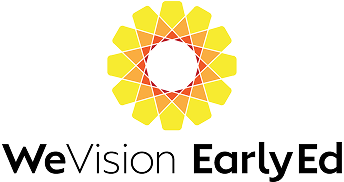
1
A Chance To Get It Right
For more than a decade, the Bainum Family Foundation has invested deeply in early childhood—the critical period from birth to age 5 that shapes a child’s learning, behavior, and health for life. In late 2021, we set out to do something that families with young children and early childhood experts in America have asked for: get child care right.
Introduction

We launched WeVision EarlyEd in our hometown of Washington, D.C.—the community we know best and where we have built trust. D.C. has made significant strides toward providing and publicly funding a range of early childhood services that families with young children and the adults who care for them need to grow and thrive. It offered a great foundation on which to build.
We first convened a cross-section of families, educators, and administrators that manage, work within, or use D.C.’s child care system every day. We wanted to better understand their experiences, concerns, and needs—and use that understanding to deepen our role as a supporter of community-led systems change. We expanded our learnings by soliciting input from hundreds of early childhood education (ECE) professionals from across the country at various conferences and meetings. We also reviewed research reports and monitored headlines for news about child care, and we convened 50 leading child care policy influencers to explore how child care policy issues are currently articulated and addressed.
Through this process, we learned that while communities have unique contexts and circumstances, the pain points around child care and the visions for an ideal child care system are the same at the core. And while we see increased (albeit still insufficient) public investments by states and local communities, they cannot make the ideal child care real without substantial and sustained state and federal funding. For these reasons, we quickly shifted our focus from local to national. Through WeVision EarlyEd, we intend to seize the moment and the momentum to make the ideal child care real.
Specifically, we must:
- Rethink when learning begins, to recognize the crucial importance of children’s early development.
- Rethink who needs child care, making quality options available to all families.
- Rethink what child care costs and who pays for it, so that options are affordable for families and educators can make a living wage.
- Rethink quality, by right-sizing regulations, aligning to baseline standards and increasing family and professional autonomy.
- Rethink governance and decision-making, to respect and benefit from the expertise of families, educators, and administrators
In July 2024, our foundation announced a five-year, $100 million commitment to early childhood nationally. This funding will provide grantees and partners with the stability they need to meet the needs of young children and their families while advancing transformative narratives and policy solutions to pave the way toward a more equitable and effective child care system across the U.S. We will be there every step of the way and will share what we are learning with practitioners, advocates, lawmakers, families, and the broader public.

Clarifying our Terms
Terms to describe the care and education of young children often are used interchangeably but typically mean different things. Some of these terms also can reflect the outdated mindsets about child care. We felt it important to reframe and clearly define the various options available to families and young children. Download this section to learn what mean when we use terms like “child care,” “early childhood education (ECE),” “trusted caregiver,” “day care,” and “proximity expert” in the report and in our work.

Clarifying OUr sCope
- WeVision EarlyEd focuses on the birth-to-5 child care system in the United States.
- This report acknowledges but does not fully capture the nuances and history of this complex system, shaped by a long history of systemic racism, sexism, and elitism that has negatively impacted nearly all who interact with it.
- WeVision EarlyEd provides policy guidance to support the work of policy experts who inform, develop, and/or implement policy solutions.
- WeVision EarlyEd holds the Bainum Family Foundation accountable for supporting young children and families.

Our Data Source
Terms to describe the care and education of young children often are used interchangeably but typically mean WeVision EarlyEd is built on the specialized knowledge and lived experiences of proximity experts—the families, early childhood educators, and program administrators who use or work within the child care system. We worked diligently to be clear about what they want in the ideal system. We gathered data and insights from them in two ways: via Human-Centered Design and Conference Sessions and Interactive Exhibits.
Human-centered design is the problem-solving process of understanding the lived experiences, as well as the context of the people and communities in a current system, to inform decisions and solutions about new policies, processes, and services that impact their lives.
